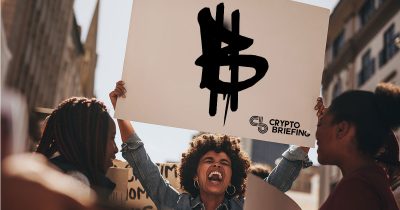Protest Coin: Bitcoin's Other Use Case
It's easy to overlook one of Bitcoin's best use cases: a form of protest against corrupt banking practices.

Share this article
It’s just the cost of doing business in the banking world: white-collar criminals routinely walk away with huge profits after paying tiny legal penalties — not a bad profit-to-cost ratio for long-term success. And it happens all the time, with banks all over the world. You could say it’s a global phenomenon, of sorts.
Bitcoin, on the other hand, is an alternative global phenomenon that operates outside the realm of banks. Think of it as an “off-the-grid” monetary system, free from anyone’s control.
Which raises the question: What if Bitcoin were to gain global adoption — not because it grew in value and thus attracted further speculation and interest — but as a tool of protest against corruption?
Before delving into the potential efficacy of such a tool, consider the following crimes for which major banks have been caught and their subsequent penalties:
Wells Fargo was fined $1 billion for “insurance and mortgage abuses” after charging more than half a million clients for car insurance they didn’t need. The bank had also charged mortgage clients additional costs for missing interest rate lock-in deadlines which were caused by delays that were, in reality, its’ own fault. The bank had also been caught committing fraudulent behavior when creating around 3.5 million fake customer accounts, charging unexpected and unnecessary fees.
Now, $1 billion sounds like an awful lot of money, and to most people it is. But it’s only a tiny fraction of Wells-Fargo’s $2 trillion held in assets.
When it comes to criminal behavior, HSBC is probably best known for its willing participation in money laundering, allowing corrupt leaders in Nigeria to clean more than 100 million dollars. The bank was also at fault for laundering millions of dollars for drug cartels and terrorist groups. The penalty for this criminal activity was equivalent to a mere five weeks of the company’s yearly profit.
Few banks have more well-documented cases of corruption than JPMorgan Chase, from its role in Madoff’s stocks and securities Ponzi scheme to the massive bank frauds that sent the entire American economy reeling in 2008. Not a single banker served any jail time for the financial crimes that caused this collapse.
Bank of America is among the most egregious of these villains, ripping off “investors, insurers, depositors, homeowners, shareholders, pensioners and taxpayers,” taking thousands of Americans to court with false evidence, selling worthless mortgages to pension funds, and defrauding insurers. The bank was bailed out by American taxpayers for being “too big to fail.”
The list goes on. Citigroup, Goldman Sachs, and numerous other banks have been fined time and time again for corruption and malfeasance. Still, these banks remain hugely profitable, regarding the billions charged in fines as little more than a minor annoyance.
Where does Bitcoin fit in?
In a classic case of projection, bank bigwigs will tell you that Bitcoin is nothing more than a tool for criminals and terrorists. It’s pretty clear that the banks are the most effective tool for such behavior. In reality, Bitcoin does the opposite.
The blockchain has many positive utilities, from moving value to immutably storing data. But with recent market excitement it’s easy to overlook one of Bitcoin’s noblest utilities: the capacity to act as a form of protest against corruption.
The rise of Bitcoin’s value is a side effect of people choosing to store wealth in a hard asset outside the banking system. Because of its decentralized nature, transactions and value can be verified without needing any central authority.
Owning Bitcoin is, whether traders intend it to be or not, a vote against fiat money and for an alternative system of trade. By exiting fiat with just a small portion of their funds, holders of the asset can remove themselves, at least partially, from participation in the cycle.
Of course, the money spent to buy Bitcoin doesn’t simply evaporate. But it leaves the hands of those who want a decentralized economy, to devalue in the hands of those who prefer the legacy system.
A partial boycott on banks, whereby citizens decide to trade in crypto, is a good place to start a larger movement. Such a movement can begin with simple changes, like offering or accepting Bitcoin for small transactions, or using it to buy goods from retailers accepting crypto. It could even be something as grassroots as offering to pay or accept cryptocurrencies instead of cash for simple jobs.
The value of Bitcoin in terms of fiat is — let’s face it — very important to traders and holders, but it’s not the only point of the innovation. The ultimate point is to allow Bitcoin to stand as an independent, decentralized economic system that cannot be usurped and corrupted by banks.
Forget for a moment, what Bitcoin is “worth” compared to fiat. Bitcoin’s value extends far beyond its price in dollars and cents. Instead, consider the value you might be able to move from a bank’s coffers into your own control. Instead of looking for those sweet fiat gains, consider using it as a tool of protest — a declaration of independence — that leaves those self-serving bank practices behind.
Share this article
